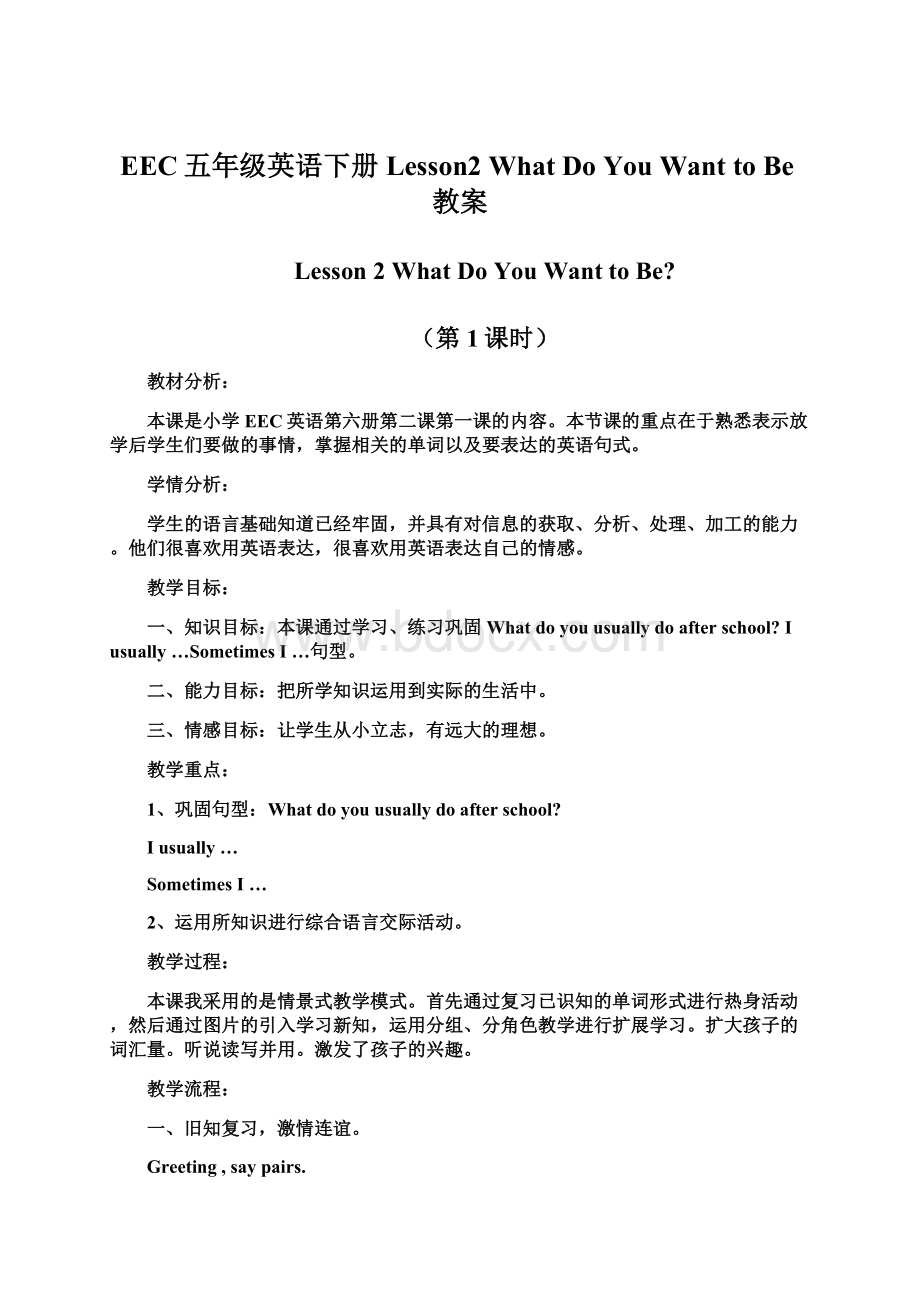EEC五年级英语下册 Lesson2 What Do You Want to Be教案.docx
《EEC五年级英语下册 Lesson2 What Do You Want to Be教案.docx》由会员分享,可在线阅读,更多相关《EEC五年级英语下册 Lesson2 What Do You Want to Be教案.docx(10页珍藏版)》请在冰豆网上搜索。

EEC五年级英语下册Lesson2WhatDoYouWanttoBe教案
Lesson2WhatDoYouWanttoBe?
(第1课时)
教材分析:
本课是小学EEC英语第六册第二课第一课的内容。
本节课的重点在于熟悉表示放学后学生们要做的事情,掌握相关的单词以及要表达的英语句式。
学情分析:
学生的语言基础知道已经牢固,并具有对信息的获取、分析、处理、加工的能力。
他们很喜欢用英语表达,很喜欢用英语表达自己的情感。
教学目标:
一、知识目标:
本课通过学习、练习巩固Whatdoyouusuallydoafterschool?
Iusually…SometimesI…句型。
二、能力目标:
把所学知识运用到实际的生活中。
三、情感目标:
让学生从小立志,有远大的理想。
教学重点:
1、巩固句型:
Whatdoyouusuallydoafterschool?
Iusually…
SometimesI…
2、运用所知识进行综合语言交际活动。
教学过程:
本课我采用的是情景式教学模式。
首先通过复习已识知的单词形式进行热身活动,然后通过图片的引入学习新知,运用分组、分角色教学进行扩展学习。
扩大孩子的词汇量。
听说读写并用。
激发了孩子的兴趣。
教学流程:
一、旧知复习,激情连谊。
Greeting,saypairs.
Always,usually,sometimes,cook,domysay?
Always,usually,sometimes,cook,domy”and“spinthecompass”topracticethesentences.
三、情境中体会语言,学习语言,应用语言
1.Stickthewords,andpracticethepronunciation.Learntoreadthewords.
2.(通过大屏幕的展示,询问what’stellme?
(1)Hepracticestheviolin.Cleanmyroom.AtthePool
Ilikegoswimmingatthepool.but,it’sjustmyandtouchthewordsontheboard.Readthewordsthattheteacherpointing,whoisquicker.learntoreadthesentence.
(3)Haveacompetition:
abigshark.
(4)Sentence:
(板书呈现)
Whatdoyouusuallydoafterschool?
Iusuallycleanmyroom.
SometimesIpairs.(Usethewordsandthesentences.)
(创设情景在语言交际中自然呈现本课知识,并使学生对新知内容有初步的了解。
)
3.Showtimeforthestudents.
T:
Whocanbetheteacher?
T:
Good,excellentteachers!
(给学生展示的空间,用询问的形式走到教室前面来体会用英语对话的乐趣,)
4.T:
Youdidagoodjob.Ourfriends3POalsowanttoplaygame.Nowlet’slistentothetapeandfindoutwhatthestory.
T:
Nowopenyourbooksandturntopage18
(听课文,在课件的辅助下,利用磁带对学生进行语言输入。
让学生在情境中体会语言。
)
T:
Okjuststopagainandrepeat
T:
Good,nowlet’slistentothetapeagain,andreadafterthetape.
(再读课文,熟悉课文的细节。
)
四.运用所学语言进行交际
1.在学生了解单词句型用法之后,现场学生就应用所学句式。
练习放学后我能做什么?
Whatdoyouusuallydoafterschool?
Iusually…
SometimesI….
2.学生选场景小组练习。
T:
Okyougettherightanswerssonowlet’spracticeingroupsbyusingWhat we’velearnt.Pleasedoit!
(让学生以语言实践为途径,开展语言应用活动,以小组语言形式汇报,使学习程度有所提升。
)
五、结合所学,升华教学内容
通过小组商定放学后的活动内容进行语言实践。
学生选场景小组练习。
T:
Whatdowedotogetherafterschool?
Pleasetalkaboutitandtellmetheresult.
Showthemwhatdoyouusuallydoafterschool?
letthestudentsintroduceit
S:
Iusually….SometimesI…
T:
Okyougettherightanswerssonowlet’spracticeingroupsbyusingwhatwe’velearnwiththepictures.Pleasedoit!
S:
OK.
(让学生以语言实践为途径,开展语言应用活动,以小组语言形式汇报,使学习程度有所提升。
)
六、布置作业
Homework:
根据给出的短文,写一篇你自已的在学校的生活计划,将课堂学习延伸到课外。
Makeaplanafrerschool.
七、板书设计
Lesson2WhatDoYouWanttoBe?
practicesclean poolmyroom.
SometimesI2WhatDoYouWanttoBe?
(第2课时)
教学目标
Objectives
(1) Talkingaboutthepeople’sdream.
(2) Learningthejobsandthecorrelativeactivities.
(3) Comprehendingthepassage.
Languageskills:
Listening:
Identifykeywordsinanutterancebyrecognizingthestress
Locatespecificinformationinresponsetosimpleinstructionsorquestions.
Recognizedifferencesintheuseofintonationinquestionsandstatements.
Speaking:
Usemodelphrasesandsentencestocommunicatewithteachersorotherlearners.
Useappropriateintonationinquestionsandstatements
Locatespecificinformationinthepassageinresponsetoquestions
Identifymainideasfromthepassagewhichteachersupport
Writing:
Developwrittenthepassagebyputtingwordsinalogicalordertomakemeaningfulphrasesorsentences,andaddingpersonalideasandinformationwhenamodelorframeworkisprovided
Structures:
(1)Iwanttobe…
(2)Iwantto…
TeachingAids:
computers,cards,aprojector.
教学流程
Teachingprocedures:
I.Warmup
T:
Hello,boysandgirls!
Ss:
Hello,Jacky!
T:
Beforeourclass,let’senjoyawonderfulsong,andwecanrelax.
通过一首歌曲使本课在轻松愉快的气氛下开始,同时教师通过歌曲提问顺利引入新课。
II.Newlesson.
a.Leadin.
T:
Whatawonderfulsong!
Thatsoundsgreat.Doyouknowwhosingsthesong?
Ss:
…
T:
Yes,youareright.XXXisafamoussinger,andthereisanotherfamousperson,Ithinkmaybeyouknowcheckthem.
T:
Doyouknowwhatelsejobs?
Ss:
…
T:
TodayIwanttoshowyouothertwojobs,theyarepilotandengineer.
b.Newknowledge.
Showthepicturesofpilotandengineer.
Studentsreadthewordsfollowtheteacher.Readthewordsonebyone.
T:
Doyouwanttobeapilot?
Ss:
…
T:
Doyouwanttobeanengineer?
Ss:
…
T:
Iwanttobeapilot.Iwanttobeanengineer.
Writeontheblackboard.
Studentsfollowtheteachertoreadthesentences.
T:
Theyarebothgoodjobs,butIthinkmaybeinthefuture,youwillbeonlyoneofthem,sopleasetellme,whatdoyouwanttobe?
Ss:
Iwanttobeapilot.Iwanttobeanengineer.
T:
Thatsoundsgreat.
Askandansweronebyone.
Accordingtothestudents’answer,theteachergivesaquestion.
T:
Good.XXXsaysdosomanythings,let’sdesignaroom,abuilding,abridge,andthethreegorgesproject.Theycanalsodesignthespaceships,look.Wow,that’sfantastic.
Studentsrepeat.
T:
Engineerscandesignspaceships.Doyouwanttodesignspaceships?
Ss:
…
T:
Howaboutthepilots?
Ifyouwanttobeapilot,maybeyoucansay:
“Iwanttoflyplanes.”
Ss:
…
T:
OK,nowpleasetellme,whatdoyouwanttodo?
Ss:
…
Writeontheblackboard.Readthesentences.
Makeadialog.Showsomepairs.
T:
Yourdreamsareverygreat.Ithinkeverybodyguess.
Ss:
…
T:
Areyourightorwrong?
Let’sreadthedialogandfindtheanswers.
Listentothetapeandrepeattwice.Studentsaskthemthenchecktheanswers.
S1:
Hi,Dongdong,Whatdoyouwanttobe?
Picture:
Iwanttobeapilot.Howaboutyou?
S1:
Iwanttobe…
S2:
…
Ss:
…
Ss:
Hi,Tino,Whatdoyouwanttobe?
Picture:
Ineverthoughtaboutmyjob.
T:
Tinoissosad.Let’scomfort’tbesosad,Tino.We’realwayswithyou.
Theothersrepeat.
通过图片以及多媒体给学生直观的感受,使学生能迅速明白词义和句意,并通过多种形式进行操练,使学生对新授知识逐渐熟练并能相互交流。
II.Presentation
T:
Todaywealaborexchange,therearemanyjobsforpeople.Ifyouwanttolookforajob,youcangothere.Let’swatchit.
Showavideo.
T:
Now,lookforajobIactlikethis.
Ss:
…
通过一段视频让学生感受对话情景,联系实际并自主交流。
IIIposition
Readashortpassageanddotheexercise.
Homework:
Writeashortpassage.Thetopicis“Mydream”,givethekeywords.
Andtalkaboutitnextlesson.
IV.Theend
T:
Nowwemuststop:
Lesson2 WhatDoYouWanttoBe?
Iwanttobeapilot.
Whatdoyouwanttobe?
Iwanttobeanengineer.
Iwanttoflyplanes.
Whatdoyouwanttodo?
Iwanttodesignspaceships.
Lesson2WhatDoYouWanttoBe?
(第3课时)
教材分析:
1、EEC教材是由黑龙江省EEC学院编写的小学英语教材。
根据小学生的年龄特点和性格爱好,教材选取学生喜闻乐见的生活内容,以生动的故事为主线,并配有欢快音乐的学习磁带,着重培养学生的听说能力和交际能力,养成良好的学习习惯。
2、本课是EEC教材第六册第二课,主要内容是学习问答自己的理想。
锻炼学生的听说能力和日常口语交际能力,知道从小就要有自己的理想,向着自己的理想目标努力。
学情分析:
教学对象为五年级学生,英语学习已有一定基础,结合这一年龄段学生的特点,充分利用歌曲、图片、歌谣、角色扮演等手段,调动学生的学习兴趣,活跃课堂气氛,提高教学效率,取得良好的教学效果。
设计理念:
英语教学面向全体学生,创造轻松和谐的学习环境,通过感知、体验、实践、参与、合作等方式,使英语学习成为一种愉悦的体验和感受,以提高学生的听说能力和交际能力,培养持续的学习兴趣,形成科学的学习方式,为终身学习打基础。
Teachingaims:
(1)Words:
always,usually,sometimes,never,artist,cook,doctor,sick,picture
(2)Sentences:
Whatdoyoudoafterschoolontheweekend?
Ialways……Iusually……,sometimesI……
Whatdoyouwanttobe?
Iwanttobe...
(3)Improveabilitiesoflisteningandspeaking.
Teachingpoints:
(1)Touse:
artist,cook,doctor,sick,picture
(2)Tousethesentences:
Whatdoyoudoafterschoolontheweekend?
Ialways……Iusually……,sometimesI……
Whatdoyouwanttobe?
Iwanttobe...
(3)Todifferentthewords:
always,usually,sometimes,never
Teachingaids:
atape,arecorder,apicture,somecards.
Teachingsteps:
Step1Warm-up
Singasong.
Whatdoyouwanttobe?
(x2)Iwanttobea…
(Actingthesentences.)
Step2Reviewingandleadingin
(1)Greetings:
T:
Hello,boysandgirls.Howareyou?
Ss:
Hello,teacher.I’m_____.Andyou?
T:
I’m_____,too.Thankyouverymuch.
(2)Review:
①Listenandwritethewords.
②Actthedialogue.
(3)Presentation:
T:
Therearesomanythingstodoafterschool.Doyouwanttoknowmydailylife?
S:
Yes.
T:
Nowlookatthescreen.(用相机把自己周一到周五放学后干的事拍下来,通过多媒体给学生演示。
)
T:
Whocanaskme?
S:
Whatdoyoudoafterschool?
T:
Icookformyfamilyon Monday,Tuesday,Wednesday,ThursdayandFriday.SoIalwayscookformyfamily.IwatchTVonMonday,Tuesday,Wednesday,Thursday.soIusuallywatchTV.IreadnewspapersonThursdayandFriday.SoIsometimesreadnewspapers.Idon’tplaybasketballonMonday,Tuesday,Wednesday,ThursdayandFriday.SoIneverplaybasketball.利用多媒体课件,把自己周一到周五放学后干的事通过表格的形式列在屏幕上,把always,usually,sometimes,never四个表示频率的副词用图片表现出来,让学生通过对比图片间的差别了解四个词语表示频率的不同。
T:
Whatdoyoualwaysusuallysometimesneverdoafterschool?
S:
IalwaysusuallysometimesneverplaysoccerplaybasketballwatchTVdomysomemore?
演示多媒体课件,学习新词组:
gotheroom,studyEnglish,practicethepiano
T:
SaturdayandSundayistheweekend(学习单词weekend,教师出示题目:
Whatdoyoudoontheweekend?
)
Ssasktheteacher:
Whatdoyoudoontheweekend?
T:
Iusuallycookformyfamily,sometimesIgotheweekend?
Thestudentsaskaccordingtheirdailylife.
T:
Youaresoclever.Let’sgoonlearningP24.Lookatthepictures,Who’sthis?
Doyouknow?
Answerme.(x3).
S1:
She’sSandy.He’sBilly.She’sCody.
T:
Doyouwanttoknowwhattheywanttobe?
Ok.Let’slearn.
(4)Step3Learning
Lookatthepictureandteachthewords:
artist\cook\doctor\sick\picture
T:
showmeyourfinger,writewithmeintheair.
T:
Pleaseopenyourbooktopage24.Lookatthepictures1.DoyouwanttoknowwhatdoesSandyBillyCodywanttobe?
Ok,Let’slistentothestory.
T:
Whocananswerme.
Ss:
Artist.Cook.Doctor.
T:
Ok,let’slistentothetapeoncemore.Learnthesentences.
(1)Readitafterthetapeandrepeat.
(2)Studentspracticeinworkpairs.
Step4Drilling
Pointtothestudentaskandansweronebyone.
S1:
Whatdoyouwantto